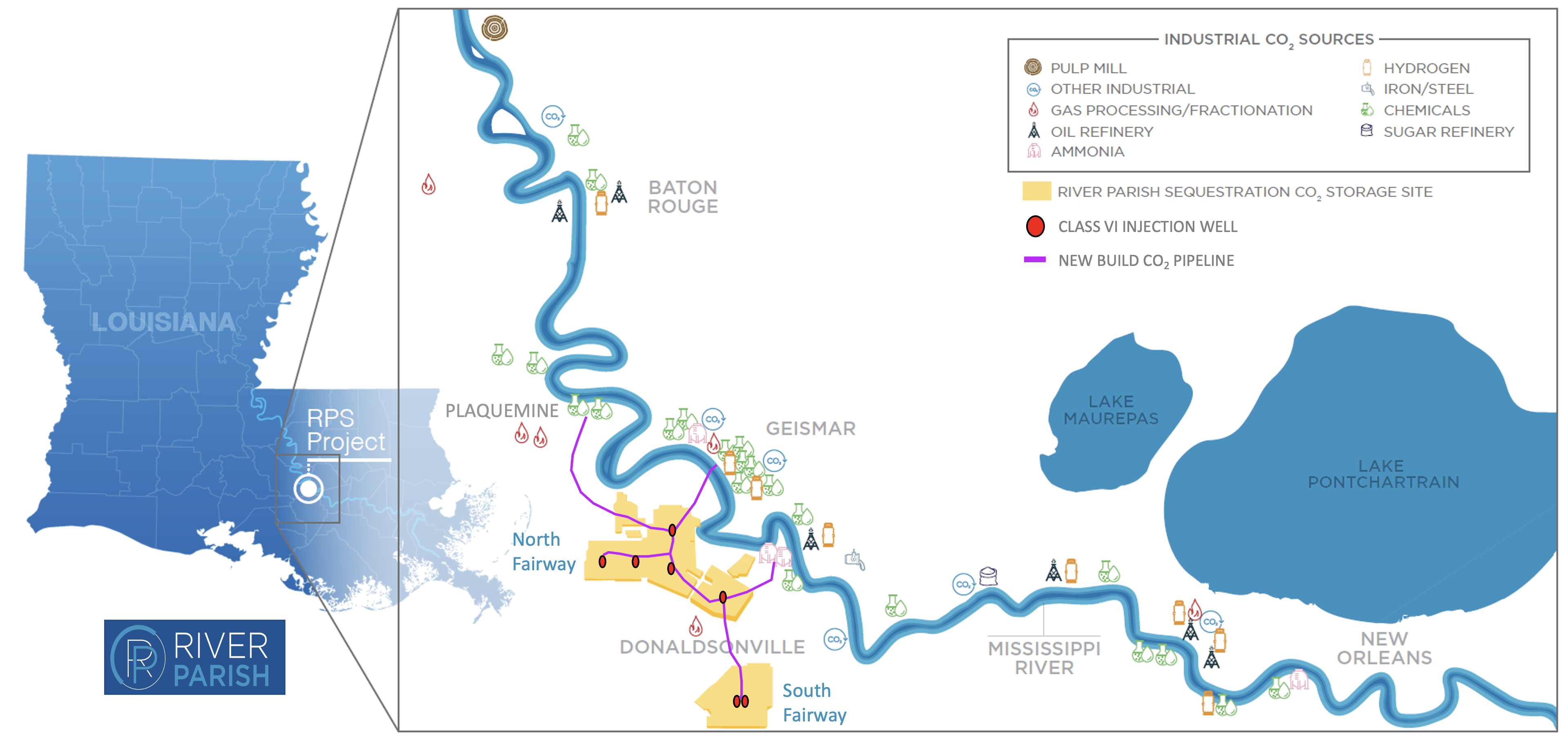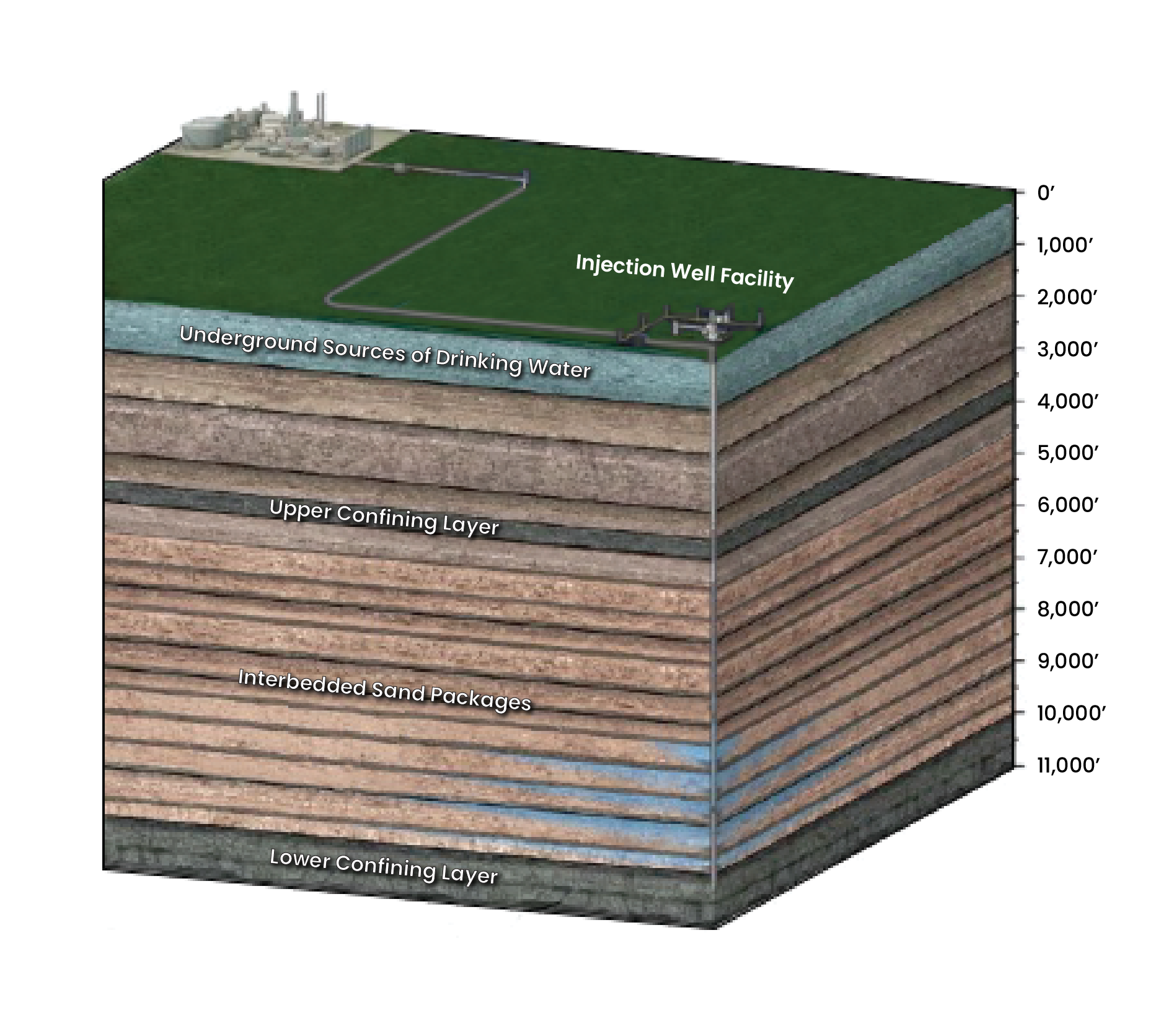The industrial and chemical corridor in Louisiana along the Mississippi River between Baton Rouge and New Orleans is the second most concentrated cluster of heavy industrial CO2 emissions in the United States. This 100-mile corridor contains over 55 industrial manufacturing plants that emit more than 60 million metric tons of CO2 annually, or approximately 8% of total US CO2 emissions from heavy industry (EPA 2019 data).

Near the Geismar-Donaldsonville area, River Parish Sequestration, a subsidiary of Blue Sky Infrastructure, has secured underground CO2 injection and storage rights underlying over 30,000 surface acres with geology capable of storing at least 14 million metric tons of CO2 annually and approximately 400 million metric tons of CO2 in aggregate. The injection and storage rights provide Blue Sky Infrastructure with access to world-class underground CO2 sequestration reservoirs, with 2,000-3,000 vertical feet of usable injection formations. The injection zones are saline-saturated, highly porous and permeable sandstone packages 5,000 to 11,000 feet beneath the surface. Multiple redundant sealing layers hundreds of feet thick comprised of impermeable shales, mudstones, and marls above and below the injection reservoirs ensure injected CO2 remains permanently confined in the storage zones.

River Parish Sequestration’s storage locations were strategically selected to provide for the lowest cost CO2 transportation and sequestration solution in the region and the least complex permitting and execution pathway.
Our selection criteria included proximity to industrial CO2 sources, avoiding population centers, minimal subsurface complexity (e.g., faulting and lithological heterogeneity), avoiding existing artificial penetrations (e.g., existing oil and gas wells), minimal sensitive environmental resource impacts (including protected wetlands), and easy surface and utility access. In addition, we designed the pipeline route with no or minimal impacts to communities and sensitive environmental resources and planned for feasible crossings of jurisdictional infrastructure and congested utility corridors.
Blue Sky Infrastructure’s storage locations were strategically selected to provide for the lowest cost CO2 transportation and sequestration solution in the region and the least complex permitting and execution pathway.
Our selection criteria included proximity to industrial CO2 sources, avoiding population centers, minimal subsurface complexity (e.g., faulting and lithological heterogeneity), avoiding existing artificial penetrations (e.g. existing oil and gas wells), minimal sensitive environmental resource impacts (including protected wetlands), and easy surface and utility access. In addition, we designed the pipeline route with no or minimal impacts to communities and sensitive environmental resources and planned for feasible crossings of jurisdictional infrastructure and congested utility corridors.
Blue Sky Infrastructure commenced the permitting process for multiple EPA Class VI CO2 injection wells and is preparing for key pipeline system permits.
Blue Sky Infrastructure’s River Parish Sequestration Project is expected to be ready to begin transportation and sequestration in 2026.
RPS Project Provides Significant Benefits
Carbon capture and underground storage of CO2 (CCS) has meaningful economic benefits for America, the State of Louisiana, and particularly for the Mississippi River industrial and chemical corridor (Louisiana Industrial Corridor). River Parish Sequestration estimates at least $50 billion of CCS investment across the Louisiana Industrial Corridor over the coming decades to decarbonize existing and new-build facilities. The River Parish Sequestration project that will serve as a large-scale and low-cost CO2 storage hub for the Louisiana Industrial Corridor will help to catalyze this investment.
The successful deployment of CCS in the Louisiana Industrial Corridor will competitively advantage existing and future facility operators at the base of the cost-curve for low carbon heavy industry, thereby enhancing the competitiveness of U.S. heavy industry and strengthening export opportunities for US manufacturers.
